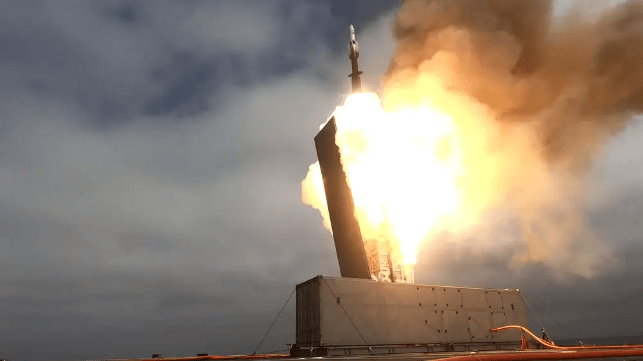Littoral Combat Ships Could Come Off the Sidelines With SM-6 Launchers

The U.S. Navy's undergunned Littoral Combat Ship classes are both about to get a major armament upgrade, according to USNI. At the USNI Defense Forum on Wednesday, outgoing Navy Secretary Carlos Del Toro told the audience that many LCS hulls will eventually carry the Mk 70 Payload Delivery System, a containerized version of the standard Mk 41 vertical launch system (VLS).
The announcement could enhance the LCS' contribution to the high-end fight. The Mk 70 can deploy the anti-air/antiship SM-6 or the antiship-capable Block V Tomahawk (TLAM) cruise missile, and its footprint is no bigger than a single forty-foot container. It was test-fired successfully from the helipad of the Littoral Combat Ship USS Savannah in October 2023, and may have been tested previously in 2022, according to The War Zone.
Each containerized Mk 70 unit has the equivalent of four VLS cells, and conceptual drawings released by the manufacturer suggest that each LCS might be capable of carrying up to three units. A total of 12 VLS cells would be a small amount of firepower compared to the 90-plus cells aboard an Arleigh Burke-class destroyer, but it would still enhance the LCS' reach for a limited strike mission or for self-defense.
The two distinct LCS classes have no long-range air defense systems of their own, and they rely upon other surface combatants to shield them from the proliferating ballistic-missile and hypersonic threats that confront naval forces today. The addition of the SM-6 could change that equation, so long as the missile receives adequate targeting data (the LCS lacks an onboard AEGIS combat system).
A supply of Block V Tomahawk missiles would also tip the scales in the LCS' favor. The newest Tomahawk is antiship-capable, and it has an unclassified range of at least 1,000 miles. This is many times greater than the range of the Naval Strike Missiles that Del Toro wants to mount on all remaining LCS hulls - and Tomahawk hits with a far heavier payload.
Del Toro's Mk 70 concept was received with some skepticism in China, where military analysts have a well-developed interest in U.S. surface warfare capabilities.

that matters most
Get the latest maritime news delivered to your inbox daily.
Zhang Junshe, a member of the PLA Naval Military Academic Research Institute, told state outlet Global Times that the Mk 70-LCS combination appears "ambitious in design but constrained in reality." He noted the LCS' small size, limited payload capacity and poor reliability record.
"Based on the U.S. descriptions, this is a classic example of 'overloading a small cart with a big load,' making it difficult to achieve sufficient combat capability. This warrants further observation," Zhang said.
